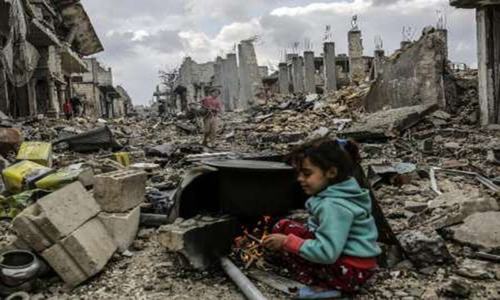Syria's regime has seized control of over a quarter of rebel-held Eastern Ghouta on the edge of Damascus after two weeks of devastating bombardment, sending hundreds of civilians into flight, a monitor said Sunday.
The Syrian Observatory for Human Rights (SOHR) said regime forces had advanced to three kilometres from Douma, the main town, after retaking “more than 25 per cent” of Eastern Ghouta, in operations mostly through farmlands.
The government's advance into the last major opposition enclave near the capital, on the back of 15 days of air strikes, artillery fire and rocket attacks that are reported to have left more than 640 civilians dead, sent hundreds of residents into flight to western parts of the enclave.
Under growing international pressure to end the bloodshed, regime backer Russia last week announced daily five-hour “humanitarian pauses” in the enclave. But while the air campaign has eased, fighting has intensified on the ground.
Backed by Russian air power, the Syrian military has advanced on several fronts, retaking control of farms and villages, a military source told state media.
The source said government forces seized a number of districts including Al-Nashabiyeh and Otaya, and had “eradicated terrorist groups” on the eastern outskirts of Damascus.
They have reached the centre of the enclave, to the edge of Beit Sawa, according to SOHR.
After advances in recent days that saw the regime seize control of 10 percent of Eastern Ghouta, rebel fighters clashed with regime forces on Sunday in the eastern part of the enclave, SOHR said.
Rami Abdel Rahman, head of the Britain-based monitoring group, said at least 12 regime fighters had been killed in two areas, Al-Rihan and Shifoniya, in overnight clashes with the Jaish al-Islam rebel group.
Jaish al-Islam shares control of rebel-held parts of Eastern Ghouta with Faylaq al-Rahman and Ahrar al-Sham. Damascus and Moscow say they are trying to clear the area of “terrorists”.
Hamza Bayraqdar, a spokesman for Jaish al-Islam, said on Twitter that the group's forces had launched “surprise attacks” against regime positions.
The observatory, which relies on a network of sources on the ground, said rebels had retaken some parts of Shifoniya.
Hundreds flee
An AFP correspondent inside Eastern Ghouta saw hundreds of civilians on Sunday fleeing from the town of Beit Sawa in the southeast of the enclave.
The observatory said some 2,000 civilians had fled regime shelling and clashes in eastern areas to western parts of the enclave.
“Everyone is on the road. There's destruction everywhere,” said 35-year-old Abu Khalil, carrying a little girl in his arms wounded on the cheek.
“Many families are trapped under rubble, the rescue workers just can't cope.” On Saturday, 18 civilians, including three children, were killed in regime bombardment of Eastern Ghouta, according to SOHR.
At least 76 pro-regime fighters and 43 rebels from Jaish al-Islam have also been killed in clashes since February 25, it says.
Encircled by regime-controlled territory and unable or unwilling to flee, Eastern Ghouta's 400,000 residents have in recent weeks suffered one of the most ferocious assaults of Syria's civil war.
Under siege since 2013, they had already been facing severe shortages of food and medicine. The region's over-burdened medical workers have been struggling to cope with the rising number of wounded.
While falling short of a 30-day ceasefire demanded by the United Nations (UN), the announcement of daily humanitarian pauses in fighting had raised hopes of some aid deliveries and evacuations.
But trucks loaded with aid have so far been unable to enter the enclave, according to the UN.
Moscow has offered safe passage to non-combatants wishing to leave Eastern Ghouta during the pause, but no Syrian civilians have left the enclave since the first break in fighting took effect on Tuesday, SOHR says.
The Russian military said no civilians exited via the established corridor on Saturday.
Damascus and Moscow have accused rebels of preventing civilians from leaving.
'Simply unacceptable'
French President Emmanuel Macron and UN Secretary-General Antonio Guterres expressed “grave concern” about the humanitarian situation in a telephone conversation late Saturday.
“The UN convoys must immediately deliver medical assistance and food aid to the besieged population,” the French presidency said.
The UN's regional humanitarian coordinator for Syria, Panos Moumtzis, sounded the alarm on Sunday over the increase in violence.
“Instead of a much-needed reprieve, we continue to see more fighting, more death, and more disturbing reports of hunger and hospitals being bombed,” he said.
“This collective punishment of civilians is simply unacceptable.” As Syria's conflict approaches its seventh anniversary, President Bashar al-Assad's forces, heavily backed by Russia, have retaken most of the territory once lost to rebels.
Eastern Ghouta remains one of the few areas outside their control, along with the northwestern province of Idlib which is partly controlled by Al Qaeda-linked militants.
Trump and May blame Russia, Syria for Eastern Ghouta suffering
Russia and Syria are responsible for the “heart-breaking human suffering” in the Syrian rebel-held enclave of Eastern Ghouta, US President Donald Trump and his British counterpart Theresa May said on Sunday.
The two leaders discussed the “appalling humanitarian situation in Eastern Ghouta” during a phone call Sunday detailed by May's Downing Street office.
“They agreed it was a humanitarian catastrophe, and that the overwhelming responsibility for the heart-breaking human suffering lay with the Syrian regime and Russia, as the regime's main backer,” the prime minister's office said.
May and Trump said “Russia and others with influence over the Syrian regime must act now to cease their campaign of violence and to protect civilians”.
















































